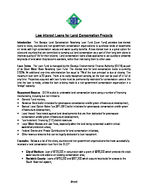Low Interest Loans for Land Conservation Projects
Introduction. The Georgia Land Conservation Revolving Loan Fund (Loan Fund) provides low interest loans to cities, counties and non-government conservation organizations to purchase lands or easements on lands with high conservation values and water quality benefits. A low interest loan is a great option for cities and counties that are committed to carrying out land conservation as a part of their long term plans to improve quality of life for their citizens. Land conservation loans allow applicants to act quickly to preserve key tracts of land when they become available, rather than risk losing them to other uses.
Loan Terms. The Loan Fund is managed by the Georgia Environmental Finance Authority (GEFA) as part of its Clean Water State Revolving Loan Fund. The interest rate for land conservation loans is currently 0.90%. An additional one-time administration fee equal to 1% of the loan principal is due at closing. The maximum loan term is 20 years. There is no early repayment penalty, so the loan can be paid off in full at any time. Properties acquired with loan funds must be permanently restricted for conservation uses at the time the loan is made, unless the loan is being made to a non-government conservation organization in a `bridge' capacity.
Repayment Sources. GEFA is able to underwrite land conservation loans using a number of financing mechanisms, including but not limited to: General Fund monies; Revenue Bond ballot initiatives for greenspace conservation and/or green infrastructure development; Special Local Option Sales Tax (SPLOST) ballot initiatives for greenspace conservation and/or green
infrastructure development; Local Impact Fees levied against land developments that are then dedicated for greenspace
conservation and/or green infrastructure development; Tax Increment Financing (TIF) district revenues Local Water Access and Use Fees, especially when the land being conserved is within critical
watershed protection areas; Federal Grants and Private Contributions for land conservation initiatives; Other revenue streams that can be legally dedicated to loan repayment.
Examples. Below is a list of the cities, counties and non-government organizations that have successfully received a land conservation loan from the GLCP.
City of Statham: Loan of $135,000 in conjunction with a grant of $299,000 which protects the city's water source and adds to an existing conservation area;
Rockdale County: Loans of $750,000 and $231,500 which acquire key tracts for access to the South River trail system;
(Over)
Virginia Highland Civic Association (NGO): Loan of $855,000 to acquire two lots and create a new urban park and storm water management demonstration site;
Bibb County: Loan of $180,000 in conjunction with a grant of $517,000 which protects an important bottomland hardwood tupelo swamp;
Glynn County: Loan of $2,750,000 in conjunction with a grant of $750,000 which protects a coastal marsh and adjacent upland threatened with development;
City of Chickamauga: Loan of $875,000 in conjunction with a grant of $365,000 which protects a Civil War historic site and grounds which will be used in part to attract tourism and provide economic benefits;
Bulloch County: Loan of $132,300 and $10,000 grant to help preserve the Fletcher Farm; Harris County: Loan of $2,000,000 and grant of $2,000,000 to place a conservation easement on
Callaway Gardens and purchase an abandoned railroad right-of-way through the property to provide residents access to this beautiful mountainous area; Decatur County: Loan of $3,000,000 to help create the Silver Lake Wildlife Management Area, which provides habitat to endangered red cockaded woodpeckers and contains the unique longleaf pine ecosystem; and City of Euharlee: Loan of $180,000 to purchase 16 acres at the confluence of the Etowah River & Euharlee Creek to create a passive park with walking paths and a boat launch. The Nature Conservancy (NGO): `Bridge' loan of $1.8 million to acquire 6,278-acre Boyles Island on the Altamaha River in Wayne County for sale to the state as a Wildlife Management Area. The Conservation Fund (NGO): `Bridge loan of $2.4 milion to acquire 2,700-acre Rocky Hammock tract on the Ocmulgee River in Jeff Davis County for incorporation into surrounding Wildlife Management Areas.
Left: Red-cockaded woodpecker at Silver Lake WMA Decatur County, GA Right: Coosa River from boat launch at new city park Euharlee, GA
(Over)
